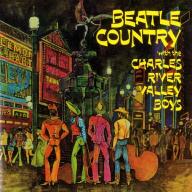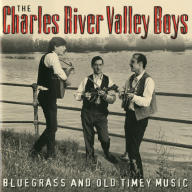The genesis of the Charles River Valley Boys began when Bob Siggins, a banjo player and student at Harvard University, and Ethan Signer, a Yale University graduate who came to Cambridge to study biophysics at M.I.T., met Eric Sackheim, a transplanted New Yorker who was a fan of old-timey music and had a large repertoire of songs and a crateful of rare recordings. Taking the band's name from a pun on the Laurel River Valley Boys, the Charles River Valley Boys made their debut at Harvard University's Lowell House Dining Commons. They continued to attract attention with frequent appearances on university radio station WHRB's shows Balladeers and Hillbilly at Harvard. Tapes from these shows were released on the band's self-produced debut album, Bringin' in the Georgia Mail. Over the next few years, the group became regular performers at Tulla's Coffeehouse in Harvard Square. After meeting Paul Rothchild, a salesman for Dumont Record Distributors, they released an album on Rothchild's short-lived Mt. Auburn label.
As the Charles River Valley Boys' full-time group status became more solidified, the membership changed. By 1966, the band consisted of Siggins, Joe Val, Jim Field and Everett Allen Lilly. The son of immigrant Italian parents, Val, who worked as a typewriter repairman, was a master of bluegrass mandolin and had an unforgettable high tenor voice. After sitting in often with the Lilly Brothers and Don Stover at the Boston bluegrass club Hillbilly Ranch, he had met and formed a band with Bill Keith and Jim Rooney. When Keith joined Bill Monroe's Bluegrass Boys and Rooney went to Greece to study under a Fulbright scholarship, Val joined the Charles River Valley Boys. New York-born guitarist and vocalist Field had been the lead singer of the New York Ramblers, a group that featured mandolinist David Grisman. Upright bass player Lilly was the son of Everett Lilly of the traditional bluegrass band the Lilly Brothers.
After Elektra Records hired Paul Rothchild as an A&R producer, the Charles River Valley Boys sent him a demo tape of four songs, including bluegrass-style renditions of the Beatles tunes I've Just Seen a Face and What Goes On. Impressed by what they heard, Rothchild and co-producer Peter K. Siegel conceived the idea of expanding the concept to a full-length collection of Beatles songs. Augmented by California guitarist Eric Thompson, who had also played with the New York Ramblers, Nashville fiddler Buddy Spicher and West Virginia dobro player Craig Wingfield, the band recorded Beatle Country in Nashville in 1966. The album became a much-sought-after collectors' item and sold for as much as $75 a copy before being reissued by Rounder in 1995. ~ Craig Harris, Rovi













